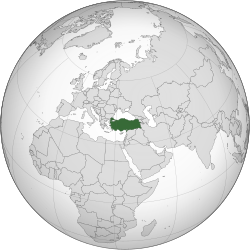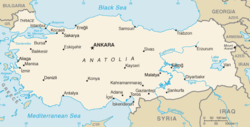Turkey
| Republic of Turkey
Türkiye Cumhuriyeti (Turkish)
| |
|---|---|
Anthem:
| |
 | |
 | |
| Capital | Ankara 39°55′N 32°50′E |
| Largest city | Istanbul 41°1′N 28°57′E |
| Official languages | Turkish |
| Spoken languages[1] | |
| Ethnic groups | |
| Demonym | |
| Government | Unitary parliamentaryconstitutional republic |
| Tayyip Erdoğan | |
| Binali Yıldırım | |
| İsmail Kahraman | |
| Legislature | Grand National Assembly |
| Formation | |
| 19 May 1919 | |
| 24 July 1923 | |
| 29 October 1923 | |
| Area | |
• Total
| 783,356 km2(302,455 sq mi) (36th) |
• Water (%)
| 1.3 |
| Population | |
• 2016 estimate
| 79,814,871[2] (19th) (19th) |
• Density
| 102[3]/km2 (264.2/sq mi) (107th) |
| GDP (PPP) | 2018 estimate |
• Total
| $2.249 trillion[4] (13th) |
• Per capita
| $27,634[4] (45th) |
| GDP (nominal) | 2018 estimate |
• Total
| $905 billion[4] (17th) |
• Per capita
| $11,124[4] (60th) |
| Gini (2013) | medium · 56th |
| HDI (2014) | high · 72nd |
| Currency | Turkish lira (₺) (TRY) |
| Time zone | FET (UTC+3) |
| Date format | dd/mm/yyyy (AD) |
| Drives on the | right |
| Calling code | +90 |
| ISO 3166 code | TR |
| Internet TLD | .tr |
Website
www.turkiye.gov.tr | |
Turkey (/ˈtɜːrki/ ( listen); Turkish: Türkiye [ˈtyɾcije]), officially the Republic of Turkey (Turkish:
listen); Turkish: Türkiye [ˈtyɾcije]), officially the Republic of Turkey (Turkish:  Türkiye Cumhuriyeti (help·info); pronounced [ˈtyɾcije d͡ʒumˈhuɾijeti]), is a transcontinental country in Eurasia, mainly in Anatolia in Western Asia, with a smaller portion on the Balkan peninsula in Southeast Europe.[7] Turkey is bordered by eight countries with Greece and Bulgaria to the northwest; Georgia to the northeast; Armenia, the Azerbaijani exclave of Nakhchivan and Iran to the east; and Iraq and Syria to the south. The country is encircled by seas on three sides with the Aegean Sea to the west, the Black Sea to the north, and the Mediterranean Sea to the south. The Bosphorus, the Sea of Marmara, and the Dardanelles, which together form the Turkish Straits, divide Thrace and Anatolia and separate Europe and Asia.[8] Ankara is the capital while Istanbul is the country's largest city and main cultural and commercial centre. Approximately 70-80% of the country's citizens identify themselves as ethnic Turks.[9][10] Kurds are the largest minority at about 20% of the population, and other ethnic minorities include Circassians, Albanians, Arabs, Bosniaks and Laz.[10][11][12][13][14] Minority languages spoken today in Turkey include Kurmanji, Arabic, Zaza, Kabardian and several others.[1]
Türkiye Cumhuriyeti (help·info); pronounced [ˈtyɾcije d͡ʒumˈhuɾijeti]), is a transcontinental country in Eurasia, mainly in Anatolia in Western Asia, with a smaller portion on the Balkan peninsula in Southeast Europe.[7] Turkey is bordered by eight countries with Greece and Bulgaria to the northwest; Georgia to the northeast; Armenia, the Azerbaijani exclave of Nakhchivan and Iran to the east; and Iraq and Syria to the south. The country is encircled by seas on three sides with the Aegean Sea to the west, the Black Sea to the north, and the Mediterranean Sea to the south. The Bosphorus, the Sea of Marmara, and the Dardanelles, which together form the Turkish Straits, divide Thrace and Anatolia and separate Europe and Asia.[8] Ankara is the capital while Istanbul is the country's largest city and main cultural and commercial centre. Approximately 70-80% of the country's citizens identify themselves as ethnic Turks.[9][10] Kurds are the largest minority at about 20% of the population, and other ethnic minorities include Circassians, Albanians, Arabs, Bosniaks and Laz.[10][11][12][13][14] Minority languages spoken today in Turkey include Kurmanji, Arabic, Zaza, Kabardian and several others.[1]
The area of Turkey has been inhabited since the Paleolithic age by various ancient Anatolian civilisations, as well as Assyrians, Greeks, Thracians, Phrygians, Urartians and Armenians.[15][16][17][18] After Alexander the Great conquered these lands, the area was Hellenized, a process which continued under the Roman Empire and its transition into the Byzantine Empire.[17][19] The Seljuk Turks began migrating into the area in the 11th century, and their victory over the Byzantines at the Battle of Manzikert in 1071 symbolizes the start of Turkification in Anatolia.[20] The Seljuk Sultanate of Rûm ruled Anatolia until the Mongol invasion in 1243, when it disintegrated into small Turkish beyliks.[21]
From the end of the 13th century the Ottomans started uniting Turkish principalities in Anatolia and then went on to create an empire that encompassed much of Southeast Europe, West Asia and North Africa.[22] The Ottoman Empire reached its peak territorial mass and became a world power during the rule of Suleiman the Magnificent in the early modern period.[23] It remained powerful and influential for two more centuries, until important setbacks in the 18th and 19th century forced it to cede strategic territories in Europe, which signalled the loss of its former military strength and wealth. After the 1913 Ottoman coup d'état, which effectively put the country under the control of the Three Pashas, the Ottoman Empire decided to join the Central Powers during World War I. During the war, the Ottoman government committed genocides against its Armenian, Assyrian and Pontic Greeksubjects.[I][24] Following the war, the conglomeration of territories and peoples that formerly comprised the Ottoman Empire was partitioned into several new states.[25] The Turkish War of Independence, initiated by Mustafa Kemal Atatürk and his colleagues against occupying Allies, resulted in the abolition of monarchy in 1922 and the establishment of the Republic of Turkey in 1923, with Atatürk as its first president.[26] Atatürk enacted numerous reforms, many of which incorporated various aspects of westernthought, philosophy, and customs into the new form of Turkish government.[27]
Turkey is a charter member of the UN, an early member of NATO, the IMF and the World Bank, and a founding member of the OECD, OSCE, BSEC, OIC and G-20. After becoming one of the first members of the Council of Europe in 1949, Turkey became an associate member of the EEC in 1963, joined the EU Customs Union in 1995 and started accession negotiations with the European Union in 2005.[28] Turkey's economy and diplomatic initiatives led to its recognition as a regional power while its location has given it geopolitical and strategic importance throughout history.[29][30][31][32]
Turkey's current administration headed by president Tayyip Erdoğan has reversed many of the earlier reforms, such as Freedom of the Press, a Legislative System of Checks and Balances, and a set of standards for secularism in government, as previously enacted by Atatürk.[33][34][35]



No comments:
Post a Comment